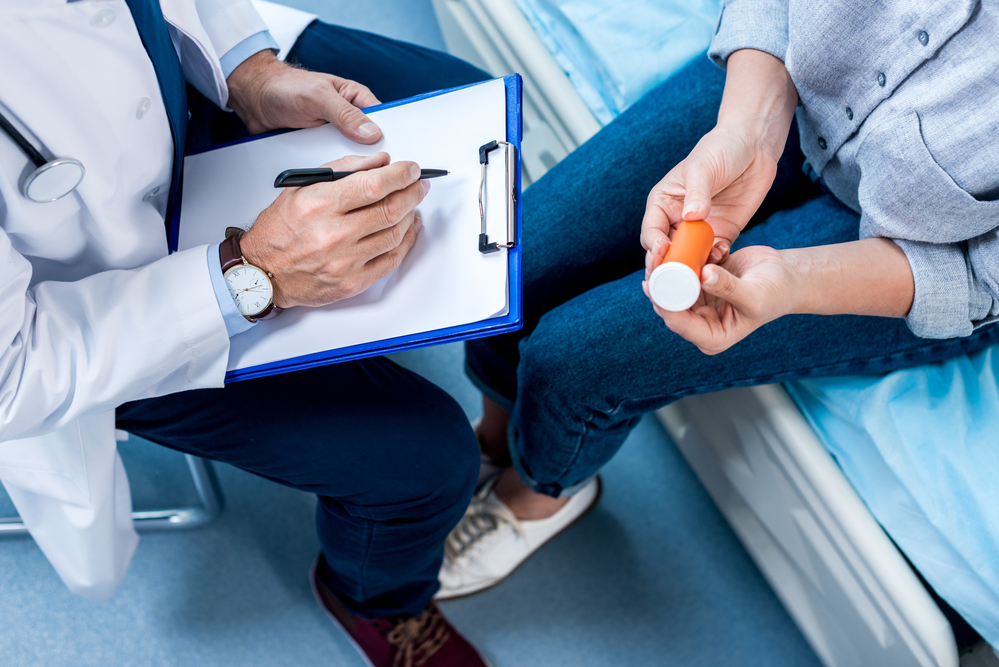In a new article in World Psychiatry, researchers suggest doctors shouldn’t be so quick to hand out antidepressants. They focus on primary care, which is where most antidepressant prescriptions originate. In mild to moderate depression, they write, doctors shouldn’t give antidepressants. Even in severe depression, they question whether antidepressant prescriptions should happen at the first visit.
“When patients with a depressive condition first visit a general practitioner, they often get the prescription of an antidepressant. We think that it is better to prescribe medication at a later stage, if at all,” they write.
The researchers were an international team led by Bruce Arroll at the University of Auckland, New Zealand, and also included Pim Cuijpers at Vrije Universiteit Amsterdam, The Netherlands.
They write that most people who present to their primary care provider with depression will have mild to moderate symptoms. About 5% of people in a primary care office have severe depression, according to their data.
According to the researchers, studies have found that the very slight difference between antidepressants and placebo, especially for mild to moderate depression, is not clinically relevant.
What about severe depression, though? They write:
“Even for patients with more severe depression seen in primary care, antidepressants may not be the best treatment at the first visit. Many of the few patients who initially present in primary care with a severe depression get better over time with or without medication.”
They note that in a Cochrane review focusing on severe to very severe depression, 42% of the patients improved on placebo—meaning that almost half of the people with severe to very severe depression may get better in just a few weeks without taking antidepressant drugs.
 Studies have found that antidepressants are associated with worse outcomes over the long term, even after controlling for the severity of depression.
Studies have found that antidepressants are associated with worse outcomes over the long term, even after controlling for the severity of depression.
But once people do start an antidepressant, they find it’s challenging to stop. Part of that is due to withdrawal effects, which about half of people experience and can be severe and long-lasting. But another part of it is fear—the fear that things will get worse if they stop the drug, even if it’s not working:
“It is also well known that many patients in primary care who use antidepressants are not willing to stop their medication, even when it is clearly not working, because they are afraid that they will get worse,” the researchers write.
What should primary care doctors do instead of prescribing antidepressants? The researchers write that the first thing they should do is simple and is indeed recommended by most treatment guidelines, such as UK’s NICE guidelines: watchful waiting. That means giving the person a chance to improve on their own, with a follow-up appointment in case they don’t. And then? Psychotherapy might be an option, which is also recommended before drugs by most guidelines for mild to moderate depression.
Specifically, behavioral activation is a recommended therapy for mild to moderate depression, although the researchers suggest that there may be other psychotherapies with equivalent effects, such as problem-solving therapy. Exercise is also recommended by some guidelines as a good first-line intervention, as research has found it to be just as effective as antidepressant drugs.
And for severe depression? The drugs can be considered, the researchers write. But, again, they add that therapy may be a better option, as the evidence suggests it has better long-term effects than antidepressant drugs.
The researchers write:
“Antidepressants should not be prescribed at the first visit if the patient has mild to moderate depression, because they have a limited efficacy and may have significant side effects. Antidepressant medication should be considered in severe depression, but not at the first visit and as an alternative to or in combination with a psychological intervention.”
****
Arroll, B., Roskvist, R., Moir, F., Harwood, M., Eggleton, K., Dowrick, C., & Cuijpers, P. (2023). Antidepressants in primary care: limited value at the first visit. World Psychiatry, 22(2), 340. https://doi.org/10.1002/wps.21057 (Link)














Thank you, Peter, for posting this news. I think this is a very good sign—doctors finally following the research!!!!
Report comment
NO ONE should be automatically handed “medication” for emotional issues. And why IN THE HELL are people “going to the doctor” for emotional issues IN MY FIRST PLACE??? And sending them off to see some DSM-trained moron for “psychotherapy” is no better.
Report comment
Finding a primary care with a DO instead of a MD can help with this problem. A MD sees a shiny object and feels a need for immediate action. DO’s tend to watch the shiny object and see if changes or develops a pattern. A lot of times that shiny object just fades away on its own.
Report comment
“An MD sees a shiny object and feels a need for immediate action.”
You’re right about DO’s. I read they use a holistic mind-body-spirit approach called Osteopathic Manipulative Treatment.
Report comment
On 9 May, Bruce Arroll et al. argued in a letter to the editor of World Psychiatry, why patients with a depressive condition should not get a prescription for an antidepressant at their first visit to a general practitioner but at a later stage, if at all.
I agreed but had reservations with their arguments and argued why these drugs should not be used at all, for anyone, which I explained in a letter to the editor. It was robotically rejected with exactly the same text as when Robert Whitaker and I got a highly relevant letter rejected, also in this journal. I have explained this on my website, see News from 6 June on https://www.scientificfreedom.dk/
Report comment